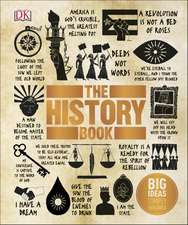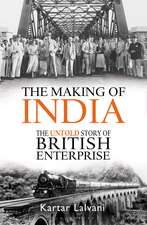Bridging the Early Modern Atlantic World: People, Products, and Practices on the Move
Editat de Caroline A. Williamsen Limba Engleză Hardback – 14 aug 2009
Preț: 1061.81 lei
Preț vechi: 1294.89 lei
-18% Nou
Puncte Express: 1593
Preț estimativ în valută:
203.17€ • 212.13$ • 168.15£
203.17€ • 212.13$ • 168.15£
Carte tipărită la comandă
Livrare economică 04-18 aprilie
Preluare comenzi: 021 569.72.76
Specificații
ISBN-13: 9780754666813
ISBN-10: 0754666816
Pagini: 276
Dimensiuni: 156 x 234 x 22 mm
Greutate: 0.66 kg
Ediția:1
Editura: Taylor & Francis
Colecția Routledge
Locul publicării:Oxford, United Kingdom
ISBN-10: 0754666816
Pagini: 276
Dimensiuni: 156 x 234 x 22 mm
Greutate: 0.66 kg
Ediția:1
Editura: Taylor & Francis
Colecția Routledge
Locul publicării:Oxford, United Kingdom
Recenzii
'The collection of essays is groundbraking in its detailed consideration of how the Altantic world impacted cultural exchanges back in Europe, particularly Spain and Portugal, and the representation of African experiences serves as a useful reminder that the Atlantic world includes continents other than the Americas.' Sixteenth Century Journal 'This collection of 10 essays, originally presented at the University of Bristol in 2005, explores communities, interactions and linkages overlooked in the burgeoning historiography of the Atlantic World. Of particular interest is the attention it pays to Africa and archaeological evidence.' European History Quarterly
Notă biografică
Dr Caroline A. Williams is Senior Lecturer in Latin American Studies in the Department of Hispanic, Portuguese, and Latin American Studies, University of Bristol, UK
Cuprins
Introduction Bridging the Early Modern Atlantic World, Caroline A. Williams; Chapter 1 1I am very grateful to the conference organizers, Caroline Williams and Mark Horton, for inviting me and for giving the opportunity to present a first version of this article at the conference for discussion. I would like to thank Catherine Briand, Evan Jones, Michael Braddick, and Anthony McFarlane for their very helpful comments and suggestions. I would also like to thank Carla Zecher, Director of the Renaissance Studies Center at the Newberry Library (Chicago), for helping me translate the original text from French to English as well as for her assistance in refining the ideas and the language of the text. Much of the research for this article was generously funded by the Social Sciences and Humanities Research Council of Canada and the Fonds québécois de recherche pour la société et la culture. I revised the text for publication while I was William Lyon Mackenzie King Visiting Professor in Canadian Studies at the Weatherhead Center for International Affairs, and at the History Department of Harvard University. I would like to acknowledge their generous and stimulating support., Laurier Turgeon; Chapter 2 Negotiating Fortune: English Merchants in Early Sixteenth-Century Seville, Heather Dalton; Chapter 3 Interlopers in an Intercultural Zone? Early Scots Ventures in the Atlantic World, 1630–1660, Douglas Catterall; Chapter 4 ‘A People So Subtle’: Sephardic Jewish Pioneers of the English West Indies, Natalie Zacek; Chapter 5 Subjects or Allies: The Contentious Status of the Tupi Indians in Dutch Brazil, 1625–1654, Mark Meuwese; Chapter 6 ‘To Transmit to Posterity the Virtue, Lustre and Glory of their Ancestors’: Scottish Pioneers in Darien, Panama, Mark Horton; Chapter 7 1 The archaeological research at Savi and Ouidah lying at heart of this chapter has been encouraged by Professors Merrick Posnansky (UCLA) and Alexis Adandé (Université Nationale du Benin), and aided by numerous
Descriere
Bridging the Early Modern Atlantic World brings together ten essays exploring the outcomes of the intermingling of people, circulation of goods, and exposure to new ideas that are the hallmark of the early modern Atlantic. Spanning the period from the earliest French crossings to Newfoundland to the end of the wars of independence in Spanish South America, the contributors direct particular attention to regions, communities, and groups whose activities in, and responses to, an ever-more closely bound Atlantic world remain under-represented in the literature. All share a central concern to explore the myriad ways in which ordinary people - through their own travels, relationships, and day-to-day choices - engaged with, and contributed to, the changes set in motion as the Atlantic world came into being.





